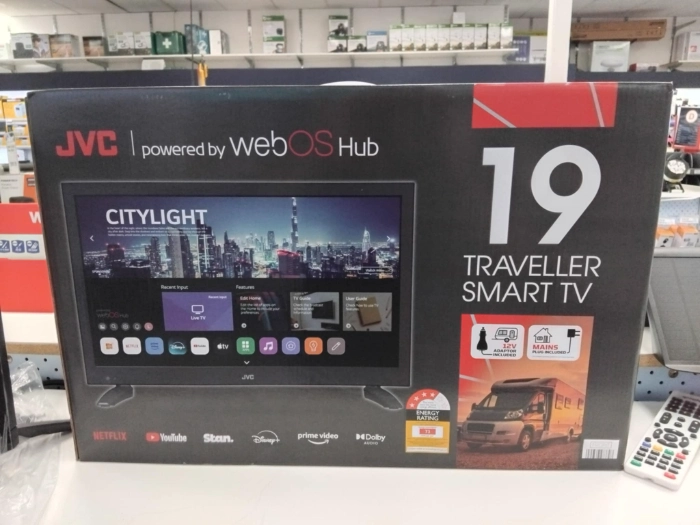12V TV for Caravans

Everything You Need to Know About 12V TVs for Caravans
If you're travelling off-grid or setting up your home on wheels, having a 12V TV in your caravan can be a game-changer. But what makes it different from a regular home TV?
The simple answer is they are designed for mobility. They offer features that standard home TV units don't. They are built to withstand the shaking and vibrations of the road surface.
12V TVs can operate off-grid using the caravan's power system, such as solar panels and batteries, whereas a regular home TV requires a 240V mains power outlet. No inverter is required when running a 12v TV. 12v TV's may also include other power options such as 24v and 240v plug in options.
Most 12V TV are designed to automatically tune into local channels based on your current location, whereas a regular TV often needs to be manually tuned each time you move to a new area.
12v TV often include built in dvd players so you can watch some of your old favourites.
Another thing to note about 12V TVs is that they are limited in size compared to the home TVs. 12v TVs range from 19 to 32 inches compared to home TVs which can range from 32 to 85+ inches.
So, which one are you going to pick? Need help on this too? Here is a list of 12v TVs you may want to consider.
🇦🇺 Where to Buy 12V TVs in Australia
🛒 1. Englaon
Website: https://www.englaon.com.au
Specialises in 12V TVs designed for caravans and RVs.
Australian-owned with models featuring smart TV, Chromecast, and DVD players.
🛒 2. Caravan RV Camping
Website: https://www.caravanrvcamping.com.au
Offers a wide selection of caravan TVs and accessories.
Stocks brands like RV Media, Sphere, and Majestic.
🛒 3. BCF (Boating Camping Fishing)
Website: https://www.bcf.com.au
Known for camping gear and sometimes stocks 12V caravan TVs.
🛒 4. Jaycar Electronics
Website: https://www.jaycar.com.au
Offers smaller 12V monitors and TVs suitable for mobile setups.
🛒 5. Access 12 Volt Warehouse
Specialist in 12V caravan appliances including TVs.
🛒 6. eBay Australia / Amazon Australia
Websites:
Great for comparing models, reading reviews, and finding deals.
🇺🇸 Where to Buy 12V TVs in the USA
🛒 1. Camping World
Website: https://www.campingworld.com
One of the largest RV accessory retailers in the U.S.
Offers a wide range of 12V TVs, including Jensen and Furrion brands.
🛒 2. TechnoRV
Website: https://www.technorv.com
Specialises in RV electronics including 12V smart TVs.
🛒 3. RecPro
Website: https://www.recpro.com
Sells RV furniture and electronics, including 12V LED TVs.
🛒 4. Amazon USA / eBay USA
Websites:
Great for browsing popular brands and reading real user reviews.
🛒 5. Walmart
Website: https://www.walmart.com
Stocks a limited range of smaller TVs, including some 12V-compatible units.

